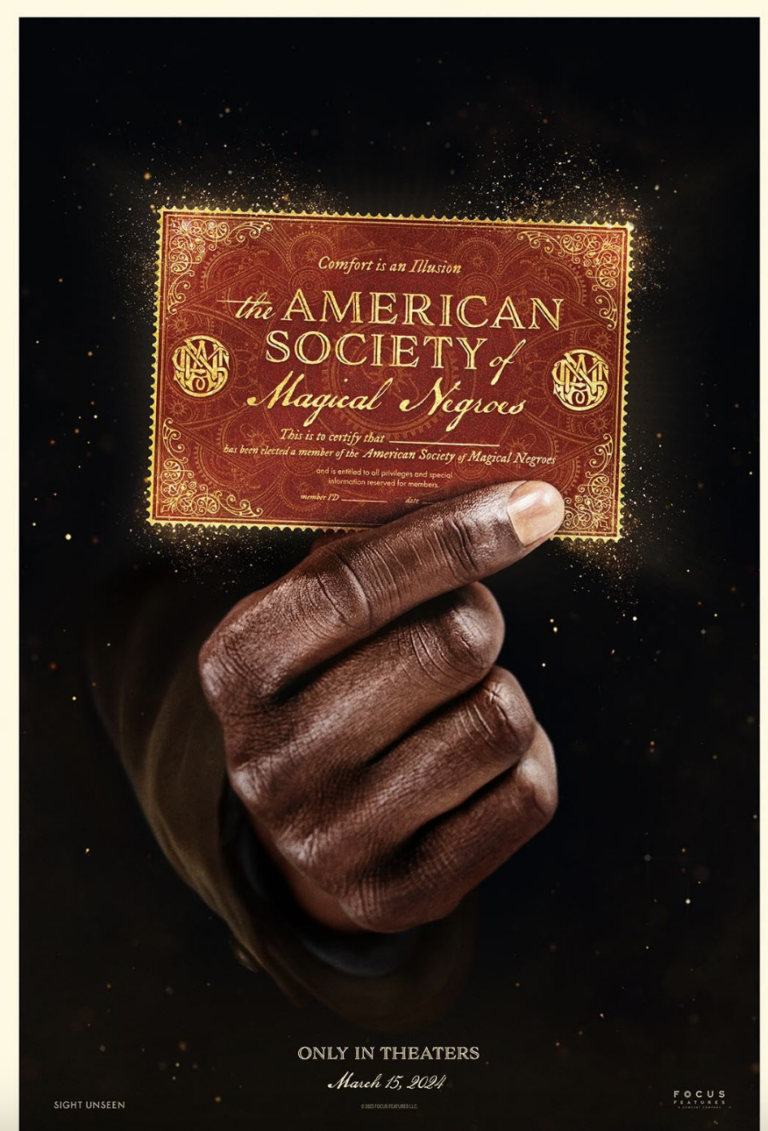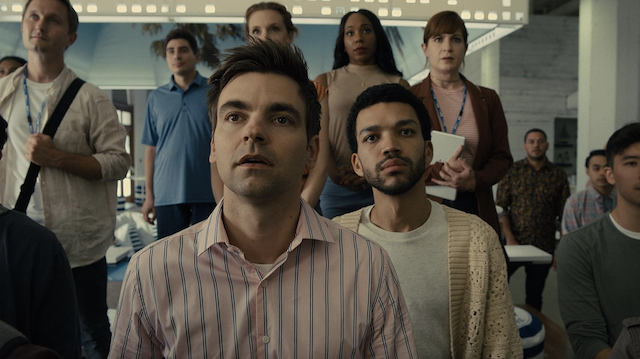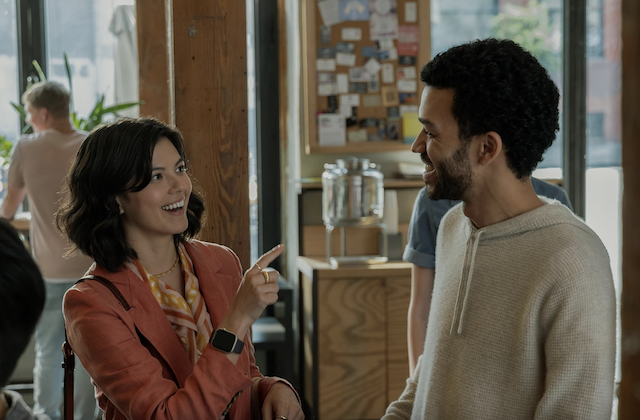
Kobi Libii’s feature directorial debut, The American Society of Magical Negroes, takes a light-hearted, satirical look at a cultural phenomenon that has recently been denigrated by filmmakers like Spike Lee, among others. The term itself refers to a cinematic or literary trope governing the strategic inclusion of Black characters in American cinematic or literary works. Magical Negroes were little more than utilitarian nigri ex machina, token characters supposedly endowed with wisdom or special insight and hence valued only for their usefulness to the non-Black protagonists.
A classic example of this might be the role of Jim in Mark Twain’s The Adventures of Huckleberry Finn, who is portrayed as a gullible but good-hearted slave willing to sacrifice his life for Huck. In the novel, Jim is relegated to speaking semi-literate dialect, a device designed to call attention to his purity of intention, as when he declares his “heart wuz mos’ broke bekase you wuz los’, en I didn’ k’yer no mo’ what bcome er me en de raf’.”
As such, the Magical Negro was viewed as a kind of noble savage, consigned forever to a minor, one-dimensional supporting role in the fraught history of American race relations since 1619. Twenty-some years ago, filmmaker Spike Lee popularized the term in a series of lectures he gave, claiming that the Magical Negro was alive and unwell in several turn-of-the-millennium films, including The Family Man, What Dreams May Come, The Green Mile, and The Legend of Bagger Vance.
 Photo by Courtesy of Focus Features/Courtesy of Focus Features – © 2024 Focus Features, LLC.
Photo by Courtesy of Focus Features/Courtesy of Focus Features – © 2024 Focus Features, LLC.
Speaking of the latter title, Lee said “Blacks are getting lynched left and right, and [Bagger Vance is] more concerned about improving Matt Damon’s golf swing! … I gotta sit down; I get mad just thinking about it. They’re still doing the same old thing … recycling the noble savage and the happy slave.”
In The American Society of Magical Negroes, which premieres this week after its debut at Sundance, Kobi Libii declares his intention to use humor and satire to flip the trope on its head. The official synopsis describes the narrative as following “a young man, Aren, who is recruited into a secret society of magical Black people who dedicate their lives to a cause of utmost importance: making white people more comfortable. Although initially enamored with his new powers, Aren begins to question the value of using supernatural means to do the very thing he’s felt obligated to do his whole life.”
Libii explains that he chose a humorous approach “to make conversation possible” around such raw issues: “For white people, it can be really unsettling to acknowledge the ways in which a country they love and identify with can still have such troubling power structures, and for Black people, it can be really painful to acknowledge the ways in which we’ve been coerced to adhere to those structures.”
The film itself opens with a scene all too familiar to aspiring young Black artists frustrated by a power structure designed to thwart them. When Aren (played superbly by Justice Smith), discards his yarn-sculpture artwork after a confrontation with a feisty art dealer, he is taken under the protective wing of Roger (David Alan Grier), a kindly bartender at the gallery opening. The fatherly Roger—described by one critic as “a congenial combination of Booker T. Washington and Albus Dumbledore”—recruits Aren into the secretive American Society of Magical Negroes, a supportive group managed by the larger-than-life badass wannabee DeDe (Nicole Beyer), who is in real life the author of #VeryFat, #VeryBrave: The Fat Girl’s Guide to Being #Brave and Not a Dejected, Melancholy, Down-in-the Dumps Weeping Fat Girl in a Bikini.
 Photo by Tobin Yelland / Focus Features/Tobin Yelland / Focus Features – © 2024 Focus Features, LLC.
Photo by Tobin Yelland / Focus Features/Tobin Yelland / Focus Features – © 2024 Focus Features, LLC.
Buoyed by these colorful mentors, Aren dives wholeheartedly into his assigned role of white-people-pleasing to hilarious results. His first assignment is to offer support to Jason (Drew Tarver), an up-and-coming executive in a cutting-edge tech startup. Things get a little complicated and off-point when Aren develops a liking for Jason’s crush Lizzie (An-Li Bogan), which threatens his good standing in the ASOMN. Though Libii’s humor seems less pungent when he is navigating gendered issues as opposed to racial ones, it is clear that he is a born satirist who knows just the right nuances to hijack in what is, overall, an engaging and whimsical look at a serious subject.
In his director’s statement, Libii says “White people write the Magical Negro trope as a kind of ‘Happy Slave’ archetype that imagines Black people truly enjoy contorting themselves to fit into white systems of power. I’m hijacking the trope to explore some of what it really costs Black people to do so.”
Rating: B
Check out more of Edward’s articles.

